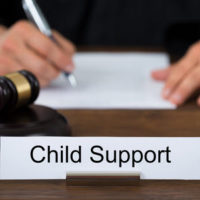Can You Get a Garnishment if an Ex Stops Paying Support?

When we think of judgments that are obtained by creditors, such as credit card companies or medical providers, we generally understand that if they obtain a judgment, they have a number of remedies. One of those remedies is garnishment of wages.
What many people don’t realize is that a judgment in a family law case for owed child support and alimony can also lead to a garnishment if not paid.
What is a Garnishment?
A writ of wage garnishment is an order entered by the court instructing an employer to pay part of an employee’s wages directly to a creditor. The amount paid is deducted automatically from the employee’s salary. No creditor–in family law or otherwise–can garnish all of someone’s wages, but they can garnish a significant amount.
A court may enter an order garnishing wages to pay child support on its own, or a party can ask the court to enter the order. Sometimes it will require a finding of contempt, a finding that someone failed to pay what they are supposed to. That requires finding that there is an inability to pay the judgment. That can make it difficult to collect against someone who is genuinely suffering financial hard times.
Because of that difficulty, many family law litigants request that a garnishment be entered at the time of the final judgment, at least for child support.
Even if the payor is not employed and can’t pay, like debtor-creditor judgments, at any time when the payor spouse starts to make more money, or if it is revealed that he or she in fact has assets to satisfy the amount of support that is owed, the court can always revisit the issue, and impose a garnishment or contempt proceedings.
Those who genuinely can’t pay alimony or child support should seek a modification of the order or divorce agreement before any garnishment orders or collections against them begin.
Family Law Garnishments
Family law garnishments can be even more severe and far reaching than ordinary debtor-creditor garnishments. Many laws that protect consumers from garnishment don’t apply to family law garnishments.
For example, the “head of household” exemption to garnishment and collections is an exemption meant to avoid garnishment on someone who supports dependents. But this exemption does not apply to alimony and child support related garnishments.
A popular strategy to protect assets is the establishment of certain kinds of trusts. Doing so will make the assets put in those trusts untouchable by a creditor. But trusts generally will not protect assets from collection of a family law-related judgment.
Even pensions, ordinarily a very protected and garnishment proof financial tool, can be taken to collect on a family law judgment.
Contact the Tampa family law attorneys at The Pawlowski//Mastrilli Law Group for help and advice about enforcing a family law judgment or court ordered alimony or child support that may be owed to you.










